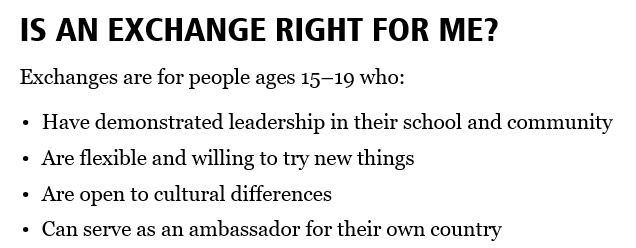Here’s the thing:
Finding an exchange student program and choosing a host country are easy.
But:
Actually getting onto the program you want, and being selected to go to your first-choice country, is very hard.
Why?
In a word, the problem is competition.
When you apply to be a foreign exchange student, you’ll be competing against high achievers – well-rounded, good citizen-type students, who are highly motivated, above average academically and with great credentials.
They may be current school captains or class presidents, or captains of the school debate team.
They may even be former exchange students, or already fluent in the language of the country they want to exchange to.
From the perspective of a student exchange program, those are all big pluses.
How do you beat those guys?
Don’t fear. I have nine simple yet extremely powerful tips which are going to help you write a student exchange application that will blow them all away.
1. Make your written student exchange application irresistible by focussing on personal characteristics that the exchange program is looking for

Look:
Most people trip up because they treat their written student exchange application as an opportunity to write a long essay about themselves.
They write about their interests and skills and hopes as an exchange student.
What should they really be doing?
Focussing on the exchange program and the kinds of students the program wants to send overseas.
Think about it.
In the mind of the person reading your application, your goals or hobbies or expectations are secondary considerations.
What that person really wants to know is whether you have the personal qualities that the exchange program thinks are important for exchange students to have.
So, when you’re writing your application, you need to keep those desirable personal qualities front and centre.
Now, here’s some good news:
Exchange organisations usually tell you the very qualities they are looking for, in very explicit terms, on their websites.
For example, the AFS Australia website states as follows:
See that?
The AFS website actually tells you very directly that AFS is looking for people who are flexible, self-confident and able to mix well with others.
If you were applying for an exchange with AFS, you’d know exactly what personal qualities to focus on in your written application, wouldn’t you?
You’d give them what they wanted and talk about how you possess all of those qualities, thereby demonstrating that you are exactly the kind of person AFS likes to send overseas, and a better candidate than your competitors.
In a similar vein, the global website for Rotary youth exchange states the following:
Again, it’s virtually laid out on a platter:
Anyone interested in applying for a student exchange with Rotary needs to demonstrate through his or her written application that he or she is:
- a leader,
- flexible,
- open to different cultures, and
- able to serve as an ambassador
Before you start writing your application, be sure to find out the kind of student your exchange program is aiming to recruit, and make sure that your application demonstrates that you meet that profile.
2. Start your answers with strong, positive statements which send the message that you meet the exchange program’s requirements exactly

In high school, you’ve probably learned that the correct way to format every paragraph in an essay is to:
- Start the paragraph with a firm statement or proposition, and then
- Provide relevant evidence or other detail which supports that statement or proposition
The same rule applies with your student exchange application.
You need to start each answer with a strong, positive statement which directly addresses the question you’ve been asked and leaves no doubt that you meet each criterion set by the exchange program.
For example, your application might have the following question:
Exchange students constantly encounter new people and situations and need to be flexible and open to change. Describe a situation in which you displayed flexibility and a willingness to change.
A good way to start your answer to that question would be as follows:
I am a flexible person who has displayed a willingness to adapt to changing circumstances.
Why is that sentence so powerful?
Because it borrows key language from the question – the words “flexible”, “willingness” and “change” – and therefore addresses the question directly.
It’s also a strong statement because it starts using the very strong statement “I am” – rather than “I consider myself” or “I aim to be” or some other weaker formulation.
In other words, that sentence sends the message that you are exactly the person the program is looking for.
Make sure that you begin your answer to each question on your application form with a sentence that:
- includes words and phrases from the question, and
- uses strong and definitive “I am” language
3. Supercharge your opening statements using the most persuasive word in the English language

Here’s how to go one better and make the opening statements in your student exchange application virtually unstoppable:
Work the word “because” into each of your statements.
In his best-selling book Influence – The Psychology of Persuasion, Dr Robert Cialdini identifies the word “because” as the most persuasive word known to man. For some reason, people are very easily persuaded by sentences and questions containing the word “because”.
What does this mean for you?
You need to capture the strong, almost hypnotic power of the word “because” and put it to work in your application.
Specifically, try to work the word “because” into each of your strong statements in order to make the reasons and statements that follow seem more convincing.
So, the introductory words we looked at earlier would change from:
I am a flexible person who has displayed a willingness to adapt to changing circumstances.
to:
I am a flexible person because I have displayed a willingness to adapt to changing circumstances
It’s just a small linguistic change, but one which should have a big impact on the effectiveness of your application.
4. Make your application the best of the bunch by supporting your statements with facts, and only facts

Now, let me help you avoid making a big mistake.
Once you’ve made your bold statement to begin each answer in your student exchange application, you need hard evidence to back it up.
There are several kinds of evidence you could use to support the statements you make in your application, such as:
- Facts – for example, “I have studied German for five years” or “I am the editor of my high school’s yearbook”
- Intentions – for example, “I plan to take an intensive German course this spring” or “I will be volunteering at a Camp Kesem camp this summer”
- Interests – for example, “I have always been interested in German history” or “I am passionate about European politics”
- Opinions – for example, “German would be a very useful language for me to learn” and “I believe that I would make a good host daughter”
The strongest of those options by an absolute mile is facts.
In fact, if you want to knock your competitors out of the ballpark, you should only use facts to back up the statements in your application.
Why are facts so powerful?
Because they are indisputable and verifiable.
In other words, they are evidence of what you have done. That is far more valuable and credible than evidence about things you would like to do or are planning to do.
Furthermore, if you only use facts in your application, you won’t sound like you’re bragging or big-noting yourself. All you’re doing is talking about factual events that have already happened.
I almost guarantee that your competitors will be using all the other, weaker types of evidence, and submitting far weaker applications as a result.
Don’t make the same mistake.
Stay gold, and stick to the facts.
5. Gather your ammunition

Here’s a useful exercise you can use to maximise the number of strong, convincing facts in your student exchange application.
Before you even start writing your application, sit down with a blank piece of paper.
Spend half an hour writing down every single positive fact you can think of which may be relevant to your exchange application, including:
- leadership positions you’ve held
- academic successes you’ve had (for example, a high GPA or any academic awards)
- evidence that you are a good citizen (such as previous volunteer work, participation in things like scouts, and even regular blood donations)
- prior relevant experience such as previous short-stay exchanges
- any language experience – not necessarily in the language of the country you’d like to exchange to
- anything showing your adaptability
- anything demonstrating your coolness under pressure
And so on.
Don’t stop writing until you’ve filled up the whole page, then go away for 24 hours.
The next day, sit down with your list and add anything else you’ve thought about in the meantime.
You want to capture absolutely any and every positive fact about yourself.
Then, when you sit down to write your application, you’ll have a ready-made stash of hard, factual evidence you can use to support your strong statements.
Then, you can move on to step 6.
6. Make sure you finish on top by playing your trump card

So, by now you have some very strong and positive statements written, and a mountain of factual evidence to support those statements.
Here’s how to seal the deal.
You need a trump card – something you’ve done which no-one else has, which makes you stand out and tells the exchange program that you are willing to go further than your competitors.
Even if everyone else is giving 100% effort, your trump card will push you to 110%. And I virtually guarantee that an exchange program will choose 110% over 100% any day of the week.
Let me show you exactly what I mean.
Case study: how I got beaten fair and square by a trump card
When I applied to go on exchange, my first choice country was Germany.
Germany is always a popular exchange destination because so many people learn German at school.
However, I thought I was in with a good chance for the following reasons:
- I was the current vice-captain (vice president) of my high school, which was one of the best schools in the region
- I was on the school debate team, editor of the school yearbook, and had a stack of other leadership and community service credentials
- I had a strong academic record, which included five years of studying German
My written application was very strong, and I thought I had a great interview with representatives from the exchange program.
I thought I had Germany in the bag.
Then, I got trumped: I got my second choice country, Switzerland, and a girl called Jessica was chosen to go on exchange to Germany.
(Switzerland turned out great, by the way, but that’s another story).
What did Jessica do that gave her the edge over me?
Like me, she was well-credentialed, had good academics and had previously studied German.
Like me, she evidently also had a strong application and made a good impression at her interview.
Unlike me, however, Jessica had undertaken an unpaid internship at her city’s German chamber of commerce and gotten a letter of recommendation from the head of the chamber. She forwarded that letter along with her application.
That was an extremely smart and strong trump card, which sent the message that Jessica was super-serious about going to Germany. It was enough to push her in front of me and everyone else wanting to go to Germany.
Jessica thought outside the box and was rewarded with her first choice of country to exchange to.
Now let me tell you how to get your own trump card.
Four trump card ideas
Jessica’s trump card idea of working at her local German chamber of commerce was a good one, because it demonstrated how committed she was to exchanging to Germany.
If you have a few months before your application is due, you can try to arrange something similar, depending upon the organisations and groups located in your area.
For example, where we live, there is:
- a nursing home for elderly Italian people
- a chapter of the American-Australian association
- a twin cities association managing the relationship with our twin city Versailles, in France, and
- a German language library and resources centre which is staffed by volunteers
Some unpaid volunteer work at any of those institutions would combine charity work and a country-specific trump card that would be hard for any exchange organisation to resist.
Think about similar opportunities which exist in your city or region, and turn one into a great trump card.
Short-notice trump card
You might have a problem:
Internships and volunteer work take time to organise and undertake.
What can you do if you’re in the throes of writing your application and need a trump card within the next week or two?
Here’s a quickly actionable trump card idea that you can deploy if you’re short of time (or no other suitable trump cards seem to be available in your area):
Get a letter of recommendation from your local mayor or congressman
Politicians are nearly always big on diplomacy and promoting the region they represent.
They also love it when one of their constituents receives an award or recognition of some kind, because it reflects well on them.
Here’s how to use these traits to your advantage:
Try making an appointment with your local mayor or congressman.
Explain that you are applying for an exchange program and spend half an hour outlining some of your credentials to him or her.
Then, very politely ask him or her for a letter of recommendation, on official letterhead.
In exchange, offer to make yourself available for a photo opportunity if you are chosen to go on exchange, and be sure to keep that promise if you are successful.
His or her answer will nearly certainly be “yes”.
A letter of recommendation from a recognised political figure can open a surprising number of doors.
The exchange program may figure that if you’ve met and made a good impression on your congressman or mayor, you’ll make a good impression on people that you’ll meet overseas.
Try it.
7. For maximum impact, put your strongest evidence first

Here’s a strange little fact:
The average adult now has an attention span of only 8.25 seconds.
Furthermore, according to a study cited by Forbes magazine, the average adult reads at a speed of about 300 words per minute.
What does this mean for you?
The person reading your student exchange application will probably only focus on the first 40-45 words of each answer you give before starting to lose focus.
That, in turn, means that you need to do two things:
First, use your strongest evidence first. Once you’ve made your strong statement for each answer, follow up with the strongest fact or evidence you have to support that statement. Because you’ve only got one or two sentences before your audience starts to lose attention, you need to fill those first few sentences with your best stuff.
Second, keep your sentences short. From a readability perspective, it’s already good practice to keep your sentences to a length of around 20 words each. Keeping your sentences short and to the point – and not filling them with unnecessary things like adjectives – will also help you to maximise the amount of information you get across in your application before the person reading it loses concentration.
8. Use these three tools to make your student exchange application a pleasure to read

The person reading your student exchange application may have dozens of written applications to read.
How do you make yours stand out?
You may be surprised to hear that one of the easiest ways to make a good impression through your application is to make it easy to read.
Here are three tools that will make your application an easy and pleasurable read:
Tool 1: Short sentences
By all means, use as many facts to support your application as you feel are relevant.
But, be sure to keep your sentences short when describing those facts.
The reason for doing this is simple:
Long sentences are tiring for a reader and can result in your core messages getting lost.
Make sure you don’t bury your high-quality content under lots of unnecessary verbiage.
Instead:
- minimise your use of colons and semi-colons
- don’t use connecting words like “which” and “that” unless you absolutely have to
- aim for one sentence per idea or example you wish to make, and
- try to keep your sentences shorter than 20 words, and no longer than 30 words
Tool 2: A font which is easy and pleasant to read
If your student exchange application is typed rather than hand-written, and you can control the font, make it more readable by applying the following font rules.
Use at least 13-point font, and preferably 14-point. The default on many word processors is 12-point which is too low and can cause eye fatigue.
Use 1.5 point line spacing, to increase the gap between lines and make them easier and more pleasant to read.
Use a plain, no-nonsense typeface like Times New Roman or Arial, which won’t distract or annoy the person reading your application, and let them focus on your content.
Tool 3: Use the active voice, and minimise the passive voice
Write as much of your student exchange application in the active voice as possible, and avoid writing in the passive voice.
What’s the difference?
A sentence written in the passive voice has no subject – that is, no person doing the verb.
For example, the following sentence is in the passive voice:
I was voted class president last year.
Now here’s the same sentence in the active voice:
My classmates voted me class president last year.
In the first sentence, it isn’t immediately apparent who voted for the narrator to be class president. The second – active voice – sentence contains the subject “my classmates”, which makes this clear.
You need to avoid writing in the passive voice, and write your entire student exchange application in the active voice instead, because:
- Readers tire when they have to read a lot of sentences written in the passive voice
- The person reading your application may recognise your use of the passive voice – particularly if they are older than about 45, or have a lot of experience with linguistics or learning languages – and mark you down for writing incorrectly
- The active voice helps to minimise any ambiguity
If you already have great content, applying these three tools will help your application make an even more positive impression and increase your chances of success.
9. Make your student exchange application twice as strong by getting not one, but TWO experts to read it

This may be the most important tip on this page:
Once your exchange program application is written, you need to ask two very specific people to proof-read and evaluate it for you.
“But wait,” you say. “I’ve already lined up my mom/dad/best friend to read my application and make suggestions”.
Unfortunately, that won’t work. Here’s why:
- your family and friends are unlikely to give you honest feedback – that is, they will tell you what you want to hear, rather than what you need to hear, in order to spare your feelings
- they won’t necessarily have any insight into what the exchange program will be looking for, and
- they are unlikely to have the technical expertise to make your answers read well
Here’s a better idea:
Get two people with specific, relevant experience and skills to review and make comments on your application.
Expert 1 – A trusted teacher at your school
First of all, you need to ask a teacher at your school who you know well and are friendly with to take a look at your student exchange application.
Why a teacher?
Firstly, because teachers spend a good part of each day evaluating work that their students have written. They are practised at reviewing documents and providing honest but constructive feedback.
In other words, the teacher you ask will most likely give you genuine, actionable tips on how to improve your application.
The second reason is that the teacher will know you and be familiar with your personality, and may be able to suggest additional information that will enhance the content of your application.
The final reason is that teachers generally have a practised eye for spelling mistakes, grammatical errors and the like. Your teacher should be able to ensure that your application contains no errors which will detract from the effectiveness of the content.
Expert 2 – A former exchange student
The second person you need to show your student exchange application to is a former exchange student at your school who you know and are friendly with.
It doesn’t matter which exchange student program he or she travelled with, or which country he or she went to.
The reason for asking this person to look at your application is simple:
He or she will know what it takes to be a successful exchange student, and should be able to offer advice on the contents of your application which will make it more appealing to the exchange organisation.
The student should also be able to coach and advise you on the application process generally, including the application interview, which I’ll also deal with in my next post.
If you have any further tips or questions about filling out an exchange program application, you can leave them in the comments below.
Good luck,
Matt





